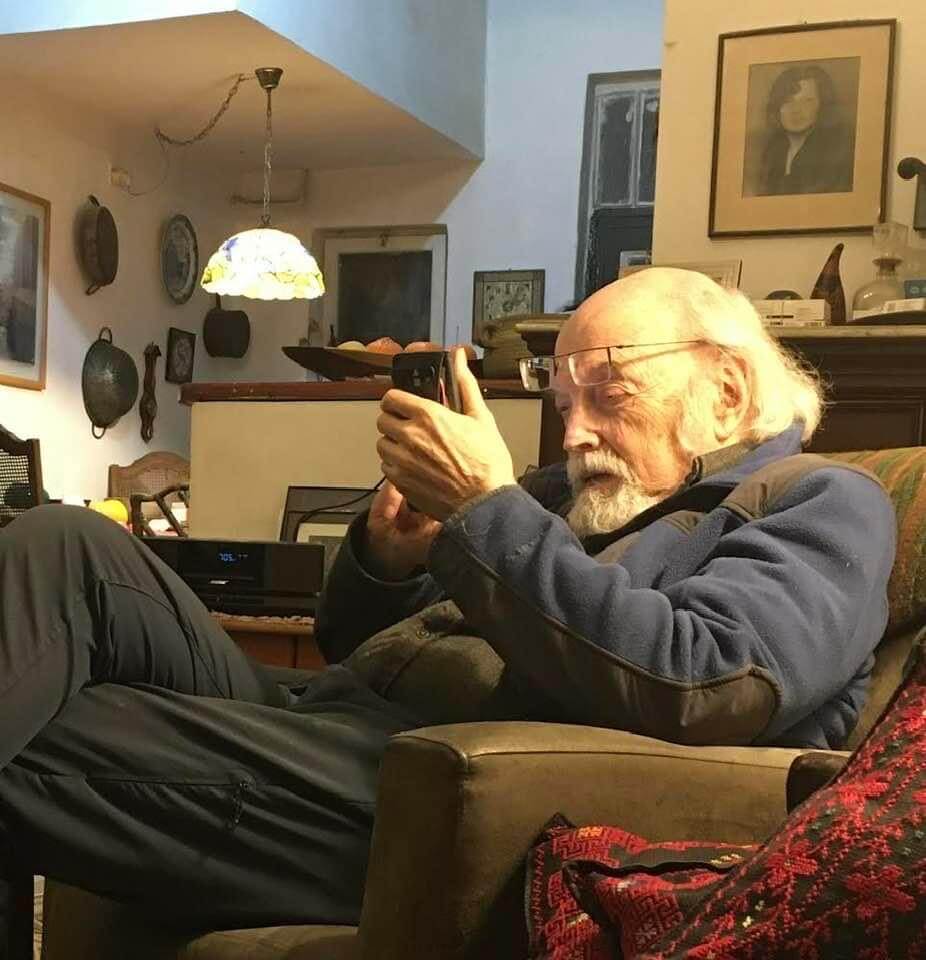A world-class scholar and mensch is gone — we can’t let his dream die with him
Paul Mendes-Flohr, the world’s foremost Martin Buber scholar, passed away on Shemini Atzeret

Paul Mendes-Flohr, photographed earlier this year in his home in Jerusalem. Photo by Margaret Olin
“When you dig a pit, there is never enough earth to refill it.”
On Oct. 11, 2023, I asked my teacher and Doktorvater, Paul Mendes-Flohr, how he was doing. He replied “from Jerusalem/al Quds” (his own valediction): “It is almost sinful to speak of oneself in these dire times.”
He also wrote: “My heart bleeds with sadness for all those — Israelis (among whom are also Muslims, Christians, and Pagans) and Palestinians (including several hundred children as a result of the bombs raining upon Gaza) who have lost their lives in the past four days. The cycle of revenge must somehow be brought to an end.”
Anyone who knew him knew that all his emails were like that.
Born Paul Flohr in Brooklyn in 1941, he became “Mendes-Flohr” upon marrying his wife, Rita, whom he would tell you at the drop of a hat was related to the 17th-century Sephardic arch-heretic Baruch Spinoza. But the familial connection to Spinoza was not Mendes-Flohr’s only heritage from modern Jewish thought.
He received his Ph.D. from Brandeis University, where he studied with the refugee historians Alexander Altmann and Nahum Glatzer. These scholars were not just experts in the German-Jewish intellectual tradition but representatives of it. Glatzer had taught at the Freie Judisches Lehrhaus at the invitation of Franz Rosenzweig and studied under Martin Buber, and Mendes-Flohr made it his life’s mission not just to study and teach these figures but to embody their Geist.
Over the course of his long career, Mendes-Flohr trained generations of scholars in the philosophical, theological and historical intricacies of German-Jewish thought. He became the world’s foremost Buber scholar, published widely on modern Jewish intellectual history, and co-edited a textbook, The Jew in the Modern World, which has been used in countless introductory college classes.
But what innumerable students of his remember most is his soft voice, warm smile, and earnest effort to personify the dialogical thought he studied. The most common word used to describe him, after “scholar,” is mensch. At office hours, he would ask about his students’ families with such sincerity and persistence that they would sometimes forget what they had come to talk to him about. I still remember when I arrived at my first class with him, a seminar on Buber’s I and Thou. I was determined and prepared, ready to impress my teacher and classmates with my intellect. And Mendes-Flohr, calling on me for the first time, reached over and pinched my cheek. I had come for Herr Doktor Professor and what I got was a bubbe.
I last heard from him about a month ago, when I received his Rosh Hashanah greetings. They read, in their entirety:
“Dear Sam and your beloved family,
May your path in the New Year be blessed with good health, creative wisdom and a horizon of hope for our tormented world.
With affection, Paul”
It kills me that he passed away on Shemini Atzeret, on what my colleague Liora Halperin resonantly calls the “secret anniversary” of the date known to the world as “Oct. 7.” It kills me because his dreams were bombed and reduced to rubble, first and foremost by the State of Israel and secondarily by the “resistance movement.” On Oct. 11 he was already referring to the “hundreds of children.” As the hundreds became thousands, and the thousands multiplied, I wondered whether he despaired of his life’s work. When he spoke of torment in his New Year’s greeting cards, you believed him.
But I can’t leave it there, because of what he meant to me and how he changed my life. I discovered his edition of Martin Buber’s A Land of Two Peoples when I was in college. I wrote to him with a question, and he answered me. Had he not done this, I honestly don’t know where I would be now. I probably wouldn’t have gone to graduate school. I wouldn’t have written a book — at least, not the book I wrote, a study of Buber’s concept of “theopolitics.”
I was his student, and he was my advocate. I lost track of how many opportunities came my way because he went to bat for me. Sometimes, to be honest, it felt like too much — did I really need to edit not one, but two volumes of the Martin Buber Werkausgabe, the collected critical edition of Buber’s works in German? That only happened because Mendes-Flohr signed me up for it. But how could I say no to editing, together with him, the critical edition of the very book that changed my life? His book? Because make no mistake: although it is a collection of Buber’s writings, A Land of Two Peoples is Mendes-Flohr’s book. Any student of Buber and modern Jewish thought generally knows the importance of an editor to an anthology.
Mendes-Flohr is gone, but his dream — Buber’s dream, of a Land of Israel/Palestine in which two peoples dwell together on terms of full equality, justice, and freedom — lives on. Indeed, it cannot die. When we have nothing else, it is all we have.
“When you dig a pit, there is never enough earth to refill it.” May the memory of Paul Mendes-Flohr bless us with a horizon of hope. Perhaps there we will find the missing earth.
















